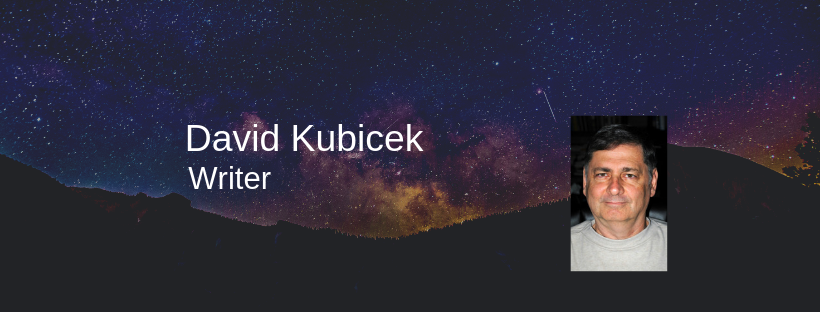by David Kubicek
“You don’t have to burn books to destroy a culture. Just get people to stop reading them.” – Ray Bradbury
Contrary to popular belief, having a college degree does not mean you’re educated. A degree is only the beginning of your education, the first tiny step. Education is a lifelong commitment. This is true for everyone but is especially true for writers.
Fortunately, I discovered this when I was in college. About midway through my course of study I took a good look at what I was learning. I was reading lots of books, writing lots of papers, and taking lots of tests. But what I really wanted to learn was how to analyze data and reach conclusions. I wanted to learning how to think. And the curriculum wasn’t helping me accomplish that goal.
I enrolled in the honors program, and under the supervision of a professor in the English Department, I undertook a research project which culminated in a thesis entitled Ray Bradbury: Space Age Visionary. I re-read all of Bradbury’s early work, analyzed it, and drew my own conclusions about it. The project was a good exercise in thinking for myself.
But even the thesis is only a beginning. I consciously made the decision not to pursue a graduate degree because I believed it would hamper my learning. Getting a degree is fine if you want to go into a particular line of work, like teaching, engineering, or business, etc. But you don’t need a degree to be a writer – the subject of my thesis, Ray Bradbury, only graduated from high school.
To be a writer you need a curiosity about everything, a hunger to learn how the world works, and a drive to understand people and why they do the things they do. You satiate this hunger by absorbing everything you can, soaking up information like a sponge. Read on a variety of topics, listen to a variety of music, watch films and TV, have new experiences, meet a variety of people, get out of your comfort zone once in a while.
There is an old Chinese parable about obtaining enlightenment – Imagine a palace with a beautiful courtyard. A young man peers through a tiny hole in the door, but he can’t see the whole courtyard at once. In middle-age he looks out on the courtyard through a small window; although he can see more, his view is still hampered. But as an old man he has thrown open the door and stands on the balcony where he can see the entire courtyard and beyond.
This illustrates the learning process throughout our lives; as we expand our horizons, the view becomes more clear.
To paraphrase Bradbury, stuff yourself with everything. The key is to continue to grow for the rest of your life by doing all the things I mentioned a couple of paragraphs ago. Don’t become stuck in time; continue to evolve. For writers, you can’t write about life thoroughly unless you strive to understand it – you never will understand it completely, but the important thing is that you continue to expand your world. For everyone else, the non-writers, you need to keep expanding your world or your world will become a cramped, cold place.
To understand our world and to change it for the better we must remember that a formal institution of learning cannot give us an education. Teachers and mentors can point the way, but ultimately we are all responsible for what we learn, and our education is a life-long commitment.
For more information about David Kubicek’s books click here.
